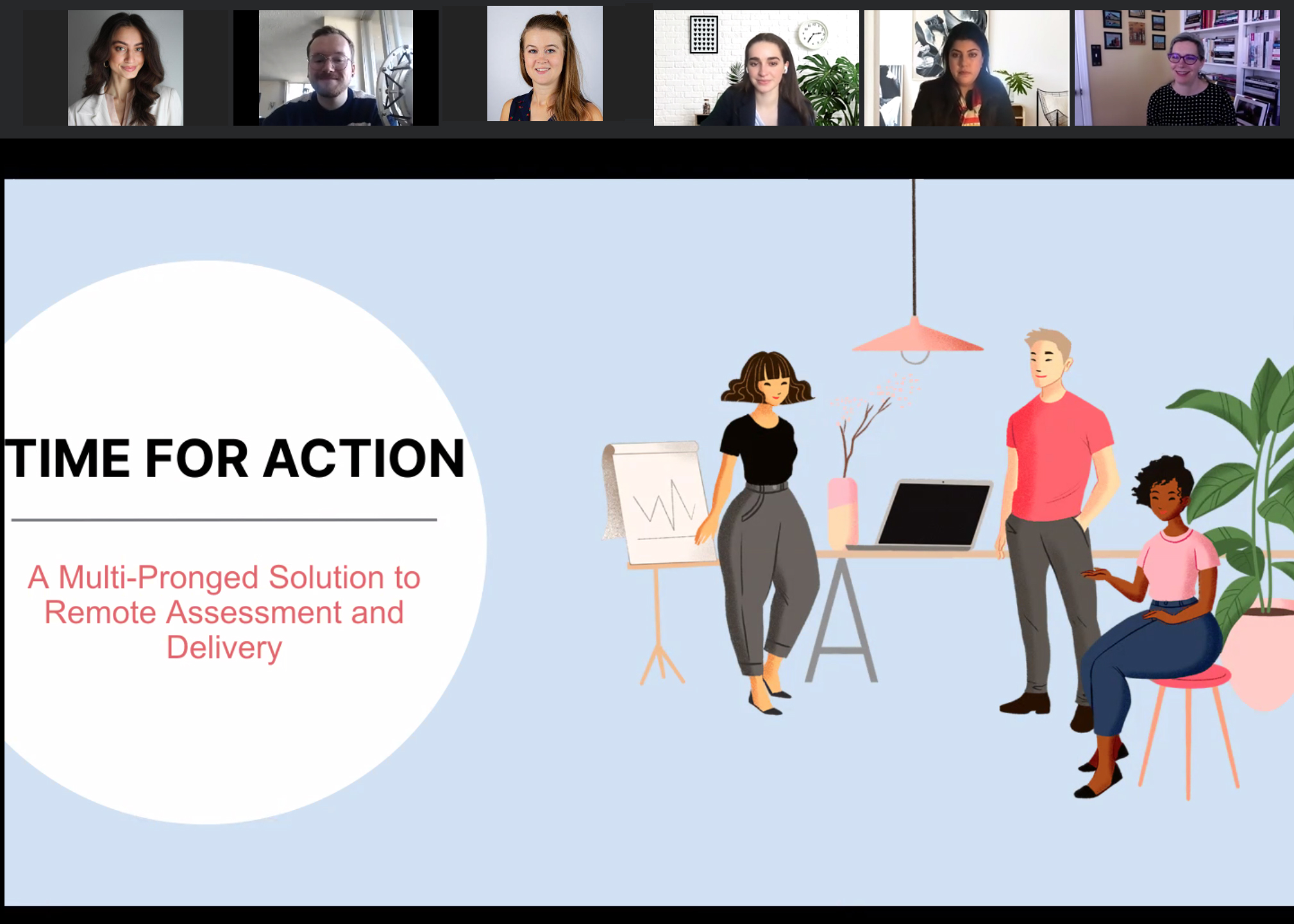Students Propose Solutions to Remote Learning Challenges
Shelby MacLeod - 25 March 2021

Undergraduate students, Samar Barazesh, Julie Shatto and Tru Hamilton during their first-round presentation in the Leadership Case Competition.
Competitions tend to be, well, competitive, and camaraderie often remains within teams, not among them. We discovered the tone changes when there’s a common, real-life problem to be solved. “In a time where everything is online, and people are isolated, the Peter Lougheed Leadership College (PLLC) Leadership Case Competition brought together diverse individuals and truly created a sense of community,” shared a competitor from the Faculty of ALES after the event on Saturday, March 13th. The excitement and encouragement to propose a viable solution trumped the competitiveness.
The case, Building a Supportive Learning Environment in a Pandemic, was revealed a week before the event. It asked competitors to create a suite of options that would meet the needs of both students and professors in ensuring the fair assessment of student learning in the winter term at the University of Opportunity--an institution similar to ours in every way but the name. The case called for solutions that balanced the needs of local and international students, professors and contract faculty in various disciplines. It also pointed to constraints of access to technology, faculty workload, academic freedom and the various downsides to online proctoring software. As our decision-makers know, there’s no easy answer to this complex problem; but students brought many creative ideas to the Zoom table without feeling pressured to get it perfect.
Prize-Winning Proposals
Fifteen teams formed by undergrad students from various UAlberta faculties proposed multiple resourceful and actionable solutions. In the final round, the top three teams wowed the judges with their breadth of research-based, realistic solutions.

Samar Barazesh, Julie Shatto and Tru Hamilton came in third place with their presentation, which suggested the institution pivot from “stagnation to innovation” by moving from synchronous exams to assessments available in 12-hour windows. They proposed that these assessments may be open-book exams with questions that require higher levels of cognitive thinking, time-sensitive questions and/or randomized test banks. They asserted this solution would be more accessible for students in different time zones⏤or those facing extenuating circumstances⏤and would help maintain privacy and academic integrity.

In second place, Teressa Yu, Ebun Akomolafe, Sophia Iligan and Harrison Yun offered a multi-pronged approach to help everyone involved feel “heard, helped and hopeful.” They focussed on providing and sharing resources that would help everyone succeed in remote learning, whether as the learner or instructor. For example, an online communication platform like Discord would allow professors to share experiences or resources and support one another. To address academic integrity, they suggested a social media campaign to be relevant, credible and meet students where they are. Lastly, they imagined that Bear Tracks could list which courses were synchronous or asynchronous, or those that had participation marks, so students could select courses that fit their needs or prepare in advance for required courses.

The team that took first place offered a plan that would “strategically [adapt] education for an online world.” Team members Jordan Kuysters, Lucia Sanchesviesca and Brittany Johnson researched the needs of various disciplines to segment their suggestions into theory-based instruction, mathematical technical applications and programs that relied on technical software. They suggested different forms of assessment for each, such as assigning projects, testing knowledge, case-based assessments, and PDF exams. Their multi-stakeholder proposal would put everyone on the same page, and they planned to collect feedback and improve throughout the process.
A Memorable Event
The competition itself was proposed by Alberta School of Business student and PLLC scholar Samantha Gardner, who helped plan the event by lending her case competition experience. Even though she didn’t take part, she was proud of everyone that did, and she felt gratified by the event: “Watching students from a variety of disciplines challenge themselves and co-create suggestions to complex problems our university faces was so incredible."
The topic was especially relevant for many judges, like David Draper, Students’ Union Vice President Academic, who has focussed on this issue during his term and was reinvigorated by the fresh perspectives. “Often, it feels like I've talked about these issues from every angle imaginable. Seeing such broad and creative ideas to solve these issues showcased to me that it will always be worthwhile to continuously re-examine any issue I face, as there is always another solution that may present itself.” Judging wasn’t an easy task with the thoughtful, high-quality presentations, and we thank David and the other judges for volunteering their time:
- PLLC Principal and Political Science Professor, Lois Harder
- Curtis Clark, Deputy Minister Alberta Education, Government of Alberta
- PLLC Mentor Team member and City of Edmonton Chief of Staff, Hana Marinkovic
- PLLC Mentor Team member and CEO of SMB4.0LLC eDatanetworks (FinTech), Rob Bennett
- PLLC Advisory Committee member and Pirani Group Partner, Zahra Somani
Each team was committed to equitable improvement for everyone involved in remote learning, and they celebrated the resilience shown over this past year. Congratulations again to the winners, and thank you to everyone who participated and put forward ideas to solve this multifaceted campus challenge hosted in the spirit of Peter Lougheed. When the outcome benefits everyone, everyone who participates wins. With the end of the semester in sight and the UAlberta community’s investment in improving assessment, we are optimistic that this remote exam period will be the best one yet.